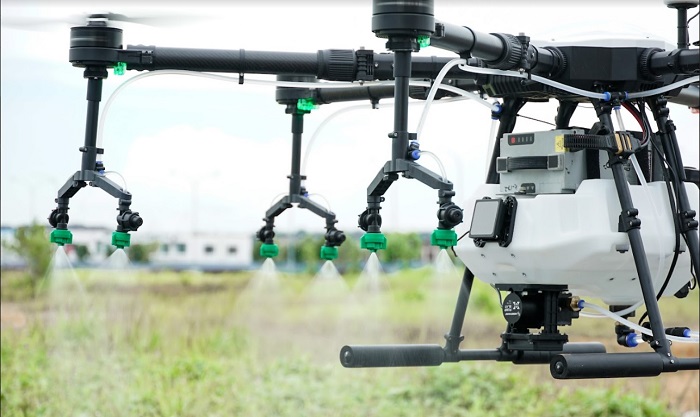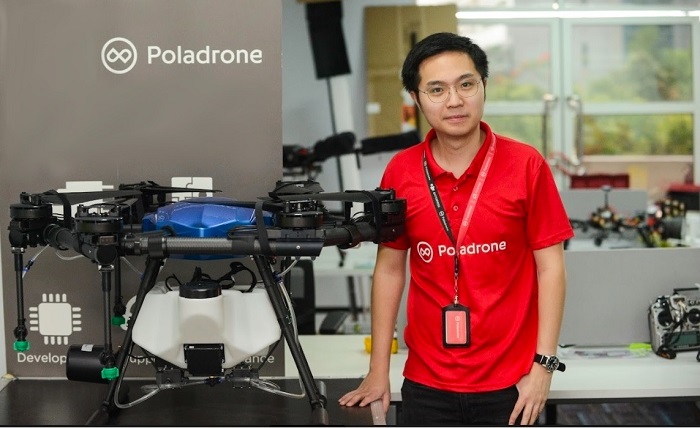Covid-19 the trigger for Poladrone’s funding, with demand going through the roof says founder Cheong Jin Xi
By Karamjit Singh October 27, 2021
- Wavemaker Partners was top preference as it knew space Poladrone was in
- Took in 4 strategic angels for regional market access, strengthening global supply chain

Malaysian based Poladrone Sdn Bhd’s record setting US$4.29 million (RM18 million) seed round that was announced today gives one an indication of the market potential investors see for drone services especially in industrials/oil palm sector.
Btw, that is not the only record Cheong Jin Xi, founder and CEO of Poladrone recently set. While the main accolades were showered on Kamarul A Muhamed of Aerodyne when research firm Drone Industry & Insights released its 2021 ranking of the Top 40 Drone Service Provider which showed Aerodyne in the top spot, Poladrone didn’t too too badly either. Infact, if there was special mention for biggest mover in the rankings, Poladrone would have won hands down, having leapt 71 spots in the ranking from a year earlier to being placed 27 globally.
But at age 31, Cheong is not concerned about rankings. The market opportunity in industrial drones is too big for the son of palm oil smallholders to get distracted by anything other than the goal of becoming a leading player in this space.
His new investors are certainly excited with the progress thus far. Besides already being a profitable company since 2020, Gavin Lee, General Partner at Wavemaker Partners which invested in the seed round, said: “Having been brought up in a household of agricultural operators … Jin Xi knows precisely what problems plantation owners face and how automation can help.”
Indeed he has parlayed that domain familiarity into now working with eight out of 10 of the biggest palm oil plantations in Malaysia, “An impressive feat that gives us confidence to back the team and their vision of propelling Southeast Asia’s agriculture industry,” adds Gavin.
Meanwhile another investor in the seed round, Ryan Poon, Partner at Hong Kong based ZB Capital Limited believes that this is the best timing for Poladrone to tackle the manpower and pest control issues of the agriculture sector in Malaysia. “Through its drone-as-a-service spraying solution, Poladrone is helping planation sites to automate one of the key business processes in order to improve efficiency and productivity, while bringing upskilling opportunities for the local workers. This creates a win-win scenario for all stakeholders in the ecosystem.”
In oil palm plantations, rhinoceros beetles pose a serious pest to immature palms, affecting their photosynthetic ability and considerably reducing fruit yield. It is industry practice to run frequent pesticide spraying to maintain plant health. In Malaysia, spraying activities using knapsack sprayers and tractors are both labour-intensive and detrimental to workers’ health. This is where Poladrone’s spraying drone service has met with eager market demand in the Covid era.
Ryan also highlights Poladrone rolling out its drone-as-a-service solutions through setting up a chain of service centers across the region, as a good strategy to provide quality and timely service to clients.

Another key strategy that Cheong (pic, above) is introducing now, with funding safely in the bank is an Employee Share Option Scheme or ESOP. “You can't do without ESOP if we intend to get and retain top talent.”
With around 30 of his current 80 head count comprising of engineers/developers/data analysts, he is looking to strengthen this team and is particularly looking for those with the following skills: autonomous systems engineering, artificial intelligence, machine learning, on-edge AI development and product development.
In the following Q&A, Cheong shares a bit more background on the funding and his regional expansion.
DNA: How long did it take to close this round?
Actually, the longest part of our fundraising round was deciding whether to raise or not to raise. As a profitable company, we did not have an urgent need to raise – but I always had a nudging feeling from Day 1 that we could do a lot more and grow much faster if we took external funding.
The trigger point that led to us going down the route of fundraising was when Covid19 hit and the demand for our Oryctes agriculture spraying drone went through the roof due to the severe labour shortage. As we scaled our team to support the growth, it highlighted the positive impact our technology has on agriculture communities by creating jobs and upskilling opportunities. As such, it became a responsibility for us to scale up our operations to bring the benefits offered by our technology to more people, faster.
On the fundraising process itself – it was extremely quick as we knew exactly which VC firms we wanted to work with. We reached out to 5 VC’s in late June 2021 and received 3 Term sheets by August 2021, one of which was from Wavemaker and our top preference and the one we signed. They were the team that understood the space that we are in and connected the best with our team.
DNA: How many angels are in this round and what value do they bring?
There are four strategic angels in this round which brings value in market access across the region, corporate finance/PE expertise to help with our subsequent rounds and strengthening up our global supply chain as we ramp up manufacturing and distribution of our products.
DNA: When did you open up in Thailand, how did this happen (you rarely hear of Malaysian companies expanding to Thailand) and what is your customer base there?
We opened in Thailand in early 2020 – right before Covid19 hit during a corporate accelerator programme called AGrowth (https://www.nest.vc/agrowth) run by Nest and Siam Kubota Corporation. Fun fact: Despite no one from our Malaysian team (including me) visiting that office due to travel restrictions, our Thailand team has been operating well with just remote support from us.
Our customer base in Thailand is mostly agriculture based, where we took the solutions that we’ve developed in Malaysia for the oil palm market and adopted it to local requirements. This is part of our strategy to diversify out of the oil palm market and also expand the total market potential for our solutions.
DNA: How did you build such a strong base of oil palm customers?
The oil palm industry (and agriculture industry as a whole) is an industry that relies heavily on trust. The hardest part was getting our first large oil palm client, after which our work spread quickly within the industry and other players started reaching out to us.
We learnt that it is crucial to always under promise and over delivery when dealing with agriculture customers which builds industry trust in our service as failure to deliver on our side translates to loss in yield on their side – something that is unacceptable.
DNA: What will be the trigger for you to expand to Indonesia?
Since the launch of Oryctes, we’ve received many requests from plantations in Indonesia and even some purchase orders from large estates. However, we have not shipped any of our products as we are not confident to provide after sales support without first establishing an office in Indonesia which we intend to do with this funding round.


